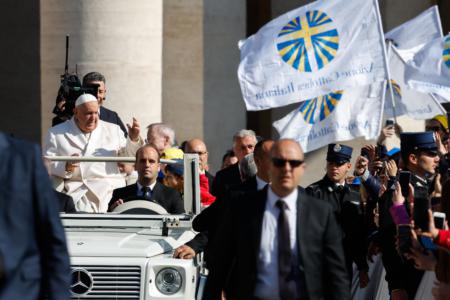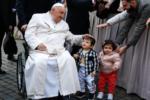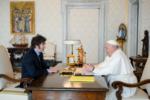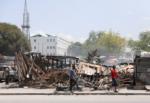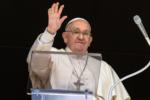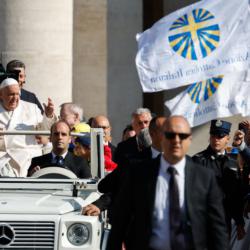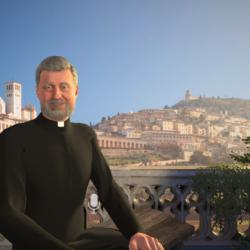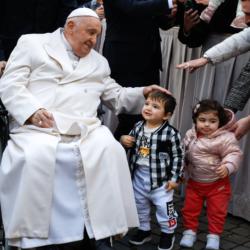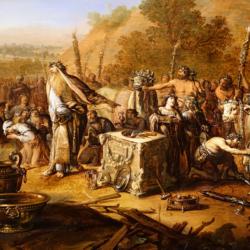VOTF holds conference in Worcester
WORCESTER — The abuse of power by Church hierarchy and a call for laity to respond were key themes at the New England Voice of the Faithful Conference held Nov. 13 at the Centrum Centre.
The conference, which was called “It’s Not History; It’s Time for Renewal,” drew 800-900 people throughout the day. It focused especially on clergy sexual abuse, but also touched on the closing of parishes and other topics.
Speaking on a panel titled “Toward Meaningful Church Renewal,” Dominican Father Tom Doyle remarked to the conference that clergy and laity are equal in God’s eyes.
“You have to overcome the fears you have of speaking your mind,” Father Doyle told his listeners, adding that they need to liberate the clerical world and that clerics have been led to believe they are special.
Father Doyle, recipient of VOTF’s first “Priest of Integrity Award” in 2002, who has worked with sexual abuse victims and their families and served as a consultant and expert witness, mentioned the need for justice for victims and the accused.
Thomas P. O’Neill III, former lieutenant governor of Massachusetts and currently chief executive officer of O’Neill and Associates, said millions have been paid properly to victims, but the bishops treated the sexual abuse crisis like a public-relations problem.
“Return to normal is not working,” he said, pointing to recent examples of controversial Church actions.
Commenting on the recent presidential election, O’Neill said Catholics should be proud a fellow Catholic ran for president and complained that certain bishops called Sen. John Kerry unworthy to receive Communion.
O’Neill said that the closing of parishes has left many Catholics feeling that the Church has not listened to them. He also questioned the rush to close them when the priest shortage has been around for awhile, and asked why laity couldn’t administer the parishes and have priests celebrate Mass.
He also told the conference that he thought the future of the Catholic Church rests less with its ordained hierarchy and more with “you the people.”
Several victims of abuse attending the conference also offered their perspectives.
Speaking on a panel titled “It’s not History: The Survivors’ Perspective,” Phil Saviano, founder of the New England chapter of the Survivors Network of those Abused by Priests, received applause when he mentioned accused priests being imprisoned.
Saviano, who made national news in 1992 when he said Worcester Diocesan priest David Holley had abused him, filed Boston’s first sexual abuse lawsuit against the Catholic Church in 1993.
Cyndi Desrosiers told the conference that when she sued Father Robert E. Kelley and the Worcester Diocese, the attorney for the diocese tried to make it appear that at age five, she was a willing participant in her abuse.
Desrosiers said she did not sign a gag order because Father Kelley “had her voice” from ages five to six-and-a-half.
“The Worcester Diocese will never have my voice,” she said, telling the audience not to let them quiet their voice, saying that they care more about the power of love than the love of power. Desrosiers, who is the Maine regional director of SNAP and has fought for years to change mandatory reporting laws in Maine and Massachusetts to include clergy, received a standing ovation.
The conference also included the presentation of the 2004 Priest of Integrity Award to Father James Scahill, pastor of St. Michael Parish in East Longmeadow, in the Springfield, Mass., Diocese. Father Scahill is known for withholding the six percent diocesan tax until Father Richard Lavigne was defrocked and no longer received compensation from the diocese.
In his acceptance speech, Father Scahill said it was regrettable VOTF had to establish an award to give a priest for integrity, adding that the majority of priests have been silent, turning their backs on children and becoming “company puppets.” Those members of the clergy are simply readers, not proponents, of the Gospel when it comes to exposing the hierarchy, he said.
The audience stood and cheered when Father Scahill remarked on the retired and active bishops who he believes should be in jail. He pointed specifically to Cardinal Law, who he said sits pompously on a throne in a basilica after having been rewarded by the pope for protecting the image of the clergy at the expense of children. Father Scahill added that there is something ill and strange about such an action and that it needs to be eradicated and forever changed.
At a press conference following the conference, both Father Scahill and Father Doyle responded to questions concerning future actions of the Church.
When asked about whether more priests are likely to speak out in the future, Father Scahill suggested that they will once the Church permits young men considering a vocation to marry. Then, the Church might have more holistic men as priests, he said.
Father Doyle named bishops, including Bishop Hughes, who he said have sold their souls for the office. Doyle also said that Father Scahill’s new bishop, Bishop Timothy McDonnell, has claimed Scahill has hurt the Church, which Father Scahill refuted, saying he hasn’t hurt the Church of Jesus Christ.
“I’ve hurt the church of bishops and clerics and of that I’m enormously proud,” he said.
Asked about threats to excommunicate politicians who support abortion, Father Scahill said the Catholic Church is not a pro-life Church. He said “we” should be against abortion, especially when it is used as birth control, but the Church should stay out of the bedrooms of adults on the birth-control issue.
He described the hierarchical Church as evil, worse than the Mafia and hypocritical.
In a breakout session called “Keeping your whole parish safe,” representatives from each of the Catholic dioceses in Massachusetts spoke about steps being taken in their respective dioceses to protect children.
Deacon Anthony Rizzuto, director of the Office of Child Advocacy, Implementation and Oversight for the Archdiocese of Boston, said as the abuse crisis broke in February 2002, a Blue Ribbon Panel made recommendations which resulted in the creation of the Commission for the Protection of Children.
Educational programs about child abuse for adults and children were selected and his office was created to implement them, Rizzuto said. An Implementation and Oversight Committee was created to advise the office’s work and produce an annual assessment.
Rizzuto added that people who formed Child Abuse Prevention (CAP) teams now present in every parish and cluster were trained to teach the adult program to staff employees and volunteers at each parish. Trainers were also taught the children’s program to teach adults and children in Catholic schools, and now the program is being implemented for parish religious-education programs.
Rizzuto also said that there are background checks and a code of conduct for diocesan employees and volunteers, and that preparations for assessment are being made.
